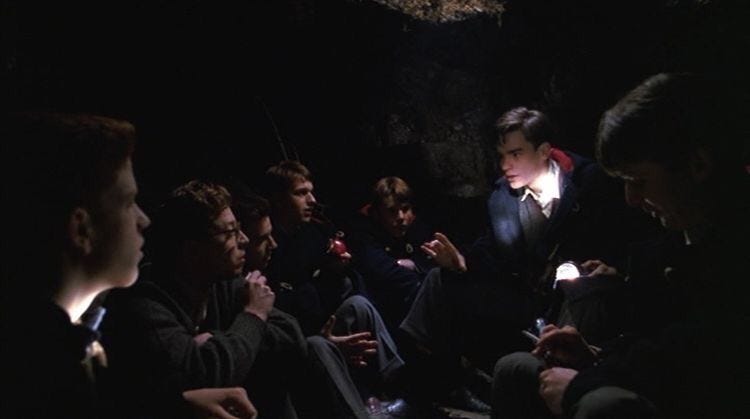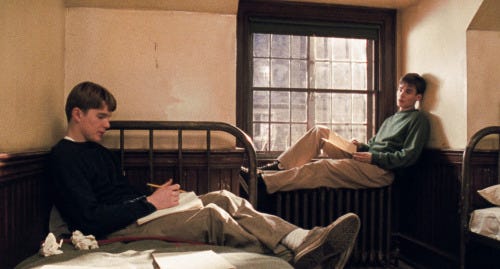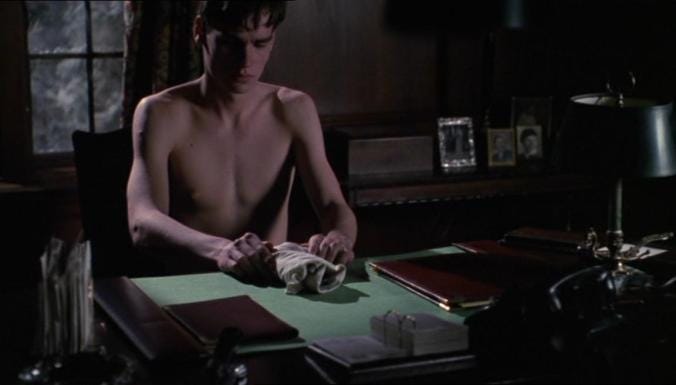“Selena: The Series,” a Small Disservice to Selena’s Legacy
'Selena: The Series' loses sight of the story's heart: Selena herself.
Incluvie Foundation Gala - Learn More
If you’re Indian you might be unlucky enough to remember the horrible remake of this classic (Mohabbatein), or you might remember ‘Carpe Diem’. What I remember is the death of Neil Perry by suicide.

Dead Poets Society is about a prestigious, all male, elite prep school, ‘Welton Academy’. When students are overburdened by the traditional ways of teaching and strict rules and regulations of the school, they meet their English teacher, John Keating. Keating’s unorthodox ways of teaching and humorous nature amazes them. As the movie progresses, their admiration for Mr. Keating (Captain) increases; and Mr. Keating, while teaching them English Literature, teaches them the way to live life.
These things might sound good on paper, but in the process he accidentally gives them something that they must never have, according to Welton’s rules: freedom.
This film was released in 1989, but it is such a befitting time to revisit it right now. Amidst a pandemic which has taken the lives of 792k people, governments are asking children to go to schools and to give examinations in overcrowded test centers so that it doesn’t waste a financial year and helps revive the economy. Between Welton’s rules and this, I can’t choose which is more bizarre.
Many writers, who are way better than me in every aspect, have already written about Dead Poets Society and why it is such a moving and thought-provoking film. This article though, isn’t about Dead Poets Society, its about Neil. Neil Perry.

Students restart the long inactive group, ‘Dead Poets Society’. Neil reads the opening statement by a previous group member:
I went to the woods because I wanted to live deliberately. I wanted to live deep and suck out all the marrow of life. To put to rout all that was not life; and not, when I had come to die, discover that I had not lived.
This strikes a chord with each one of them, but especially with Neil. His father (Mr. Perry) has never let him do anything that he likes. Mr. Perry dropped him out of the school annual of which he was the editor, because Mr. Perry thought he was taking part in a lot of unnecessary extracurricular activities. Mr. Perry wants Neil to be a doctor. Robert Frost took the road less traveled, but Neil couldn’t. Maybe even Robert Frost wouldn’t have dared to, if his father was like Mr. Perry.
I shall be telling this with a sigh Somewhere ages and ages hence: Two roads diverged in a wood, and I- I took the one less traveled by, And that has made all the difference
In one scene, an excited Neil barges into his room where he finds his roommate, Todd (a young Ethan Hawke). He tells Todd about going to audition for a play and about how he finally knows what he wants to do. When Todd says “But your father wouldn’t let you do it”, Neil yawps irritatingly, “Can I even enjoy the idea for a little while?”

It seems criminal to me that some parents think that the onus of fulfilling their dreams lies on their children and that their children should live life on their terms. Whenever something bugs me, I resort to philosophy. This time an old friend comes to my rescue; Kafka.
In his novel, The Trial, there is a parable named “Before the Law.” A man from the country seeks the law and wants to get entry into the law, but the gatekeeper doesn’t let him go inside. When he asks the gatekeeper if he could ever get inside, the gatekeeper replies: “It’s possible, but not now.” He tries everything, even bribing the gatekeeper, but still, the gatekeeper doesn’t allow him to go inside. The gatekeeper says, “I am taking these so you don’t have the regret of not trying everything.” The man decides to wait outside the door. The gatekeeper also tells him that there are more gatekeepers inside. Days, months, years pass by, but still the gatekeeper doesn’t let him go inside. At last, the man dies outside.
Yes, its an odd story, but that’s Kafka. As with everything else that Kafka wrote, this too depends on how you interpret it. Mr. Keating while teaching his students said:
Just when you think you know something you have to look at it in another way.
So let’s take another look at “Before the Law.” What stood out for me in this story is that the gatekeeper didn’t want a bribe, but he took it so that the man wouldn’t think that he didn’t try everything. The man also knew that even after offering the gatekeeper bribe, he wouldn’t allow him to go inside, but he gave him the bribe anyway so he could know that he left no stone unturned. I think the man was satisfied when he died because he knew that he tried everything in his might to go inside, whether or not he went inside, that depended on the gatekeeper.
We also want to do so many things but refrain from doing them, sometimes because of our family or society and sometimes because of our self doubt. These gatekeepers don’t let us go inside, but ask yourself have you tried enough?
Neil also knew that his father wouldn’t allow him to continue acting, but he still asked his permission. Though he got through the first door when he acted in that play, he couldn’t get past his father who was standing as another gatekeeper before the law. After the play, during their quarrel, Neil says to Mr. Perry, “I’ve got to tell you what I feel.” Mr. Perry shouts, “Then tell me what you feel, what is it, is it more of this acting business?” He then replies, “Nothing.“

This is where he stopped trying, this is where he gave up. Not when he took his father’s gun, not when he pulled that trigger, but when he said “Nothing.” It is regretful that even being the best student of Welton wasn’t satisfying enough for his father. What’s more heartbreaking is that some parents would prefer a dead child than a disobedient one. If there’s one thing that we can learn from “Before the Law,” its that we should never give up. Even if this is the first gatekeeper out of many that would come along the way, even if it takes some time to persuade yourself and others, it’s worth it. Achieving your goal would depend on a lot of things, but at least you will know you tried.
This coming of age drama though isn’t flawless. One specific scene is actually very problematic: Knox kisses Chris on her forehead while she is drunk and never faces any repercussions; Chris actually defends him in front of her fiancé. Apart from that, there isn’t even a single person of color in the movie, whether that was an unsaid rule of Welton, whether institutional segregation was still going on in late 1980s, I don’t know. But for most of its runtime, Dead Poets Society’s brilliance overpowers its shortcomings.
Dead Poets Society is brilliant because Schulman (writer) managed to combine defeat and optimism, rejection and love, craziness and daring, fear and freedom. There is one part of “Before the Law” that I didn’t tell you: In his final moments, the man asks the gatekeeper, “If everyone seeks justice then why hasn’t anyone come here in years?” To which the gatekeeper responds, “No one else could ever be admitted here, since this gate was made only for you. I am now going to shut it.”

It is something to think about: that there are few doors that are made just for you and you don’t even try to get in, afraid of rejection or failure. Whenever you fail, just tell yourself “It’s possible, but not now”. What Dead Poets Society and “Before the Law” share is that neither has a happy ending, but still they tell you so much about how to live life and that’s the beauty of great storytellers. They tell of an event at a specific time while exploring the journey of a lifetime. Life is but an experience, and seize the day you must. Take it from the dead poets, when you die, you wouldn’t want to discover that you didn’t live.

Related lists created by the same author
'Selena: The Series' loses sight of the story's heart: Selena herself.